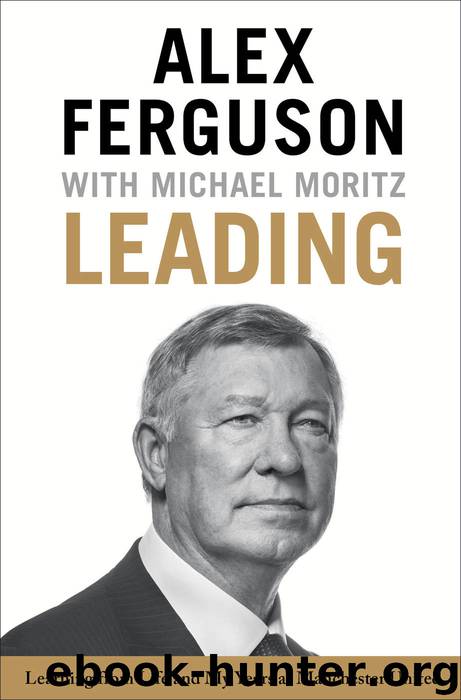Leading: Learning from Life and My Years at Manchester United by Alex Ferguson & Michael Moritz

Author:Alex Ferguson & Michael Moritz
Language: eng
Format: mobi
Tags: Business & Economics / Motivational, Business & Economics / Leadership, Sports & Recreation / Business Aspects
Publisher: Hachette Books
Published: 2015-10-05T14:00:00+00:00
8
OWNING THE MESSAGE
Speaking
As a manager I communicated with a number of different constituencies and each required special handling: the owner, the coaches and other club staff, the players and the supporters.
Having a healthy, open line of communication with the boss is vital. Few of us don’t have a boss. Perhaps the founders of successful companies have designed things in such a way that they don’t feel they have anyone they need to please–beyond their inner demons–but the rest of us do. I might have been seen as ‘The Boss’ by the players, but in football the real boss is the owner, who can hire and fire the manager at will.
I learned this the painful way at St Mirren when I was always arguing with the chairman, Willie Todd, the owner of a painting and decorating company, who had bought the club shortly after I joined. He didn’t know much about football and I helped educate him. Before long he began to think he knew a lot about the game and we were soon at loggerheads. It was a very nasty experience, and got to the point where we were not talking to each other. In retrospect, there was only one way it was going to end–and that was badly for me. It did. I was sacked. Managers have to find a way to talk to their bosses, regardless of their differences in character; otherwise it will only end miserably.
At Aberdeen, I wasn’t about to repeat the mistake. The personality of Dick Donald, Aberdeen’s chairman between 1970 and 1993, was very different from Willie Todd’s, and I found him easier to get along with. Though we became close, our conversations were always tinged with formality. I addressed him as ‘Mr Chairman’, and he always called me ‘Mr Ferguson’, which helped show I understood the difference between our roles. It was important to establish these boundaries because he was a constant presence around the club, and we would talk almost every day. My other key relationship at Aberdeen was with Archie Knox, my assistant manager. We went everywhere together–working during the day and socialising, when we had time, with our wives in the evening. When I moved to United in 1986 I insisted that he came with me. His last name could have been Ferguson and, while I understood his decision to leave United in 1991 to help Walter Smith at Rangers, it ended a wonderful working relationship.
By the time I got to United I was 44, had experienced success at Aberdeen (where we had won ten trophies and a number of players had earned Scottish caps) and learned that maintaining a healthy relationship with the owner and club chairman was vital. I used to go and see Martin Edwards, United’s owner and chairman, in his book- and trophy-filled office at Old Trafford a couple of times a week. No subject was off limits, and I kept him fully informed of everything I was working on and concerned about. We saw eye to eye about most things, with the exception of my own compensation.
Download
This site does not store any files on its server. We only index and link to content provided by other sites. Please contact the content providers to delete copyright contents if any and email us, we'll remove relevant links or contents immediately.
Hit Refresh by Satya Nadella(8354)
The Compound Effect by Darren Hardy(7600)
Change Your Questions, Change Your Life by Marilee Adams(6678)
Nudge - Improving Decisions about Health, Wealth, and Happiness by Thaler Sunstein(6656)
The Black Swan by Nassim Nicholas Taleb(6227)
Daring Greatly by Brene Brown(5674)
Deep Work by Cal Newport(5530)
Principles: Life and Work by Ray Dalio(5347)
Rich Dad Poor Dad by Robert T. Kiyosaki(5183)
The Myth of the Strong Leader by Archie Brown(4804)
Man-made Catastrophes and Risk Information Concealment by Dmitry Chernov & Didier Sornette(4769)
Big Magic: Creative Living Beyond Fear by Elizabeth Gilbert(4749)
The Slight Edge by Jeff Olson(4736)
Discipline Equals Freedom by Jocko Willink(4652)
Digital Minimalism by Cal Newport;(4605)
The Motivation Myth by Jeff Haden(4548)
Stone's Rules by Roger Stone(4433)
Management Strategies for the Cloud Revolution: How Cloud Computing Is Transforming Business and Why You Can't Afford to Be Left Behind by Charles Babcock(4144)
The Doodle Revolution by Sunni Brown(4062)
